Effective Communication Strategies in Nursing: A Comprehensive Review
VerifiedAdded on 2022/08/17
|6
|1400
|20
Report
AI Summary
This report examines the critical role of effective communication in nursing practice, highlighting its impact on patient care and outcomes. It synthesizes key findings from multiple research papers, including studies on therapeutic communication skills, communication differences within nursing groups and with other healthcare professionals, and the importance of interpersonal skills. The report emphasizes the need for nurses to develop strong communication abilities, including active listening, empathy, and the ability to build trust with patients. It also underscores the significance of clear and concise communication within healthcare teams to ensure coordinated and effective patient care. The analysis explores the benefits of incorporating communication skills training into nursing education and the use of reflective evaluation to enhance self-assessment and improve nurse-patient relationships. The report concludes by emphasizing the need for nurses to be confident communicators, capable of initiating dialogue and adhering to professional standards to address patient concerns and improve the overall quality of healthcare delivery.
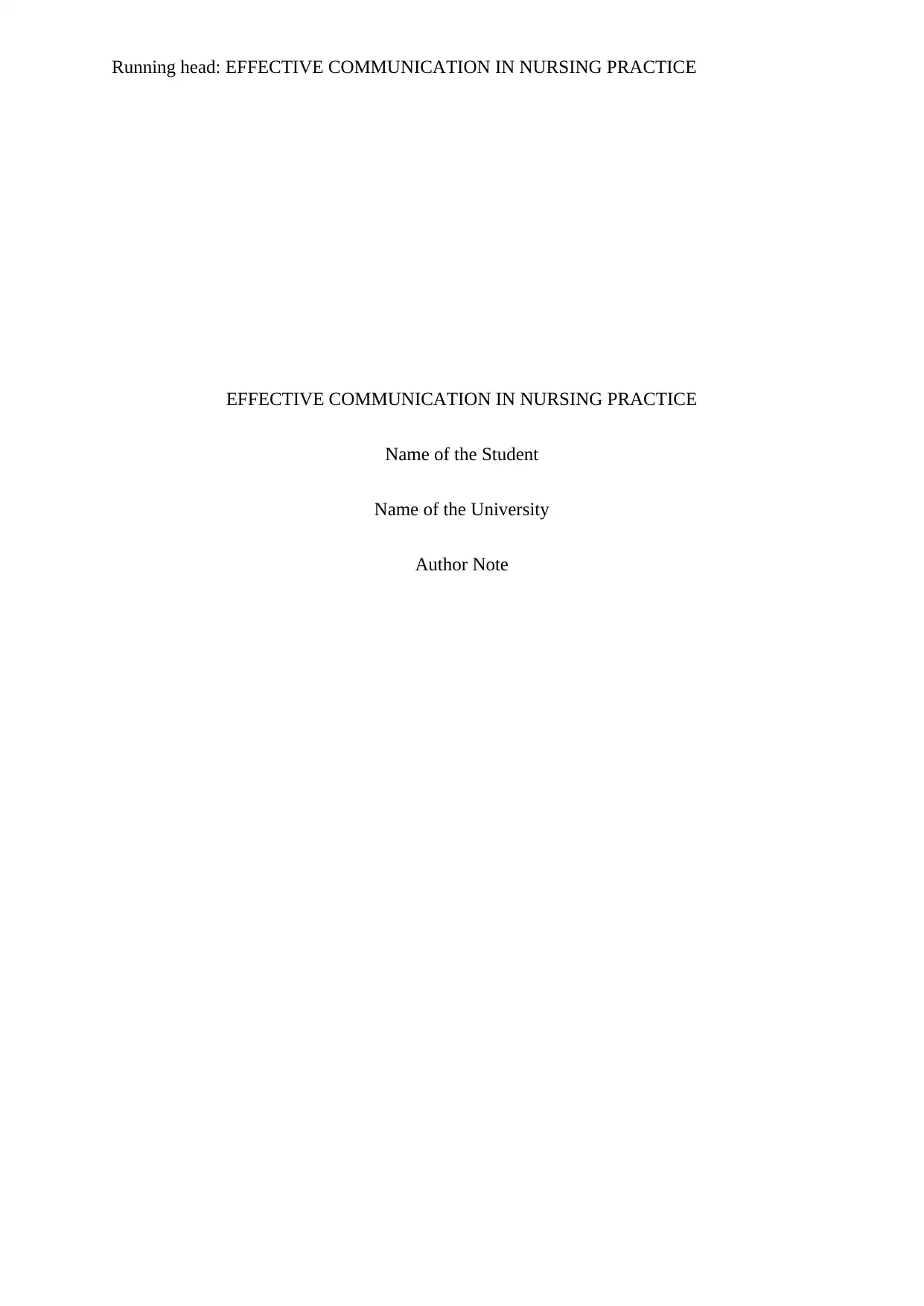
Running head: EFFECTIVE COMMUNICATION IN NURSING PRACTICE
EFFECTIVE COMMUNICATION IN NURSING PRACTICE
Name of the Student
Name of the University
Author Note
EFFECTIVE COMMUNICATION IN NURSING PRACTICE
Name of the Student
Name of the University
Author Note
Paraphrase This Document
Need a fresh take? Get an instant paraphrase of this document with our AI Paraphraser
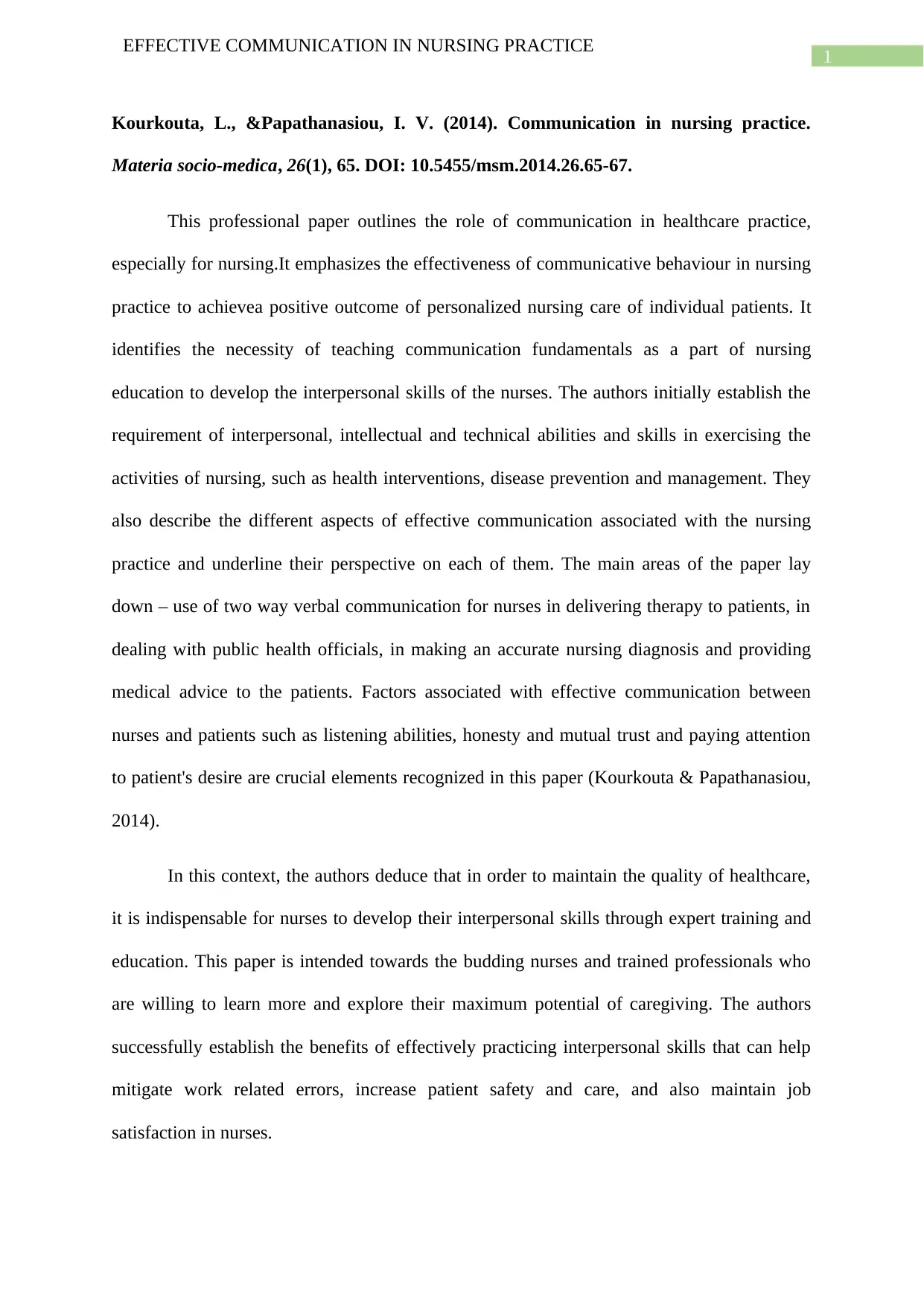
1
EFFECTIVE COMMUNICATION IN NURSING PRACTICE
Kourkouta, L., &Papathanasiou, I. V. (2014). Communication in nursing practice.
Materia socio-medica, 26(1), 65. DOI: 10.5455/msm.2014.26.65-67.
This professional paper outlines the role of communication in healthcare practice,
especially for nursing.It emphasizes the effectiveness of communicative behaviour in nursing
practice to achievea positive outcome of personalized nursing care of individual patients. It
identifies the necessity of teaching communication fundamentals as a part of nursing
education to develop the interpersonal skills of the nurses. The authors initially establish the
requirement of interpersonal, intellectual and technical abilities and skills in exercising the
activities of nursing, such as health interventions, disease prevention and management. They
also describe the different aspects of effective communication associated with the nursing
practice and underline their perspective on each of them. The main areas of the paper lay
down – use of two way verbal communication for nurses in delivering therapy to patients, in
dealing with public health officials, in making an accurate nursing diagnosis and providing
medical advice to the patients. Factors associated with effective communication between
nurses and patients such as listening abilities, honesty and mutual trust and paying attention
to patient's desire are crucial elements recognized in this paper (Kourkouta & Papathanasiou,
2014).
In this context, the authors deduce that in order to maintain the quality of healthcare,
it is indispensable for nurses to develop their interpersonal skills through expert training and
education. This paper is intended towards the budding nurses and trained professionals who
are willing to learn more and explore their maximum potential of caregiving. The authors
successfully establish the benefits of effectively practicing interpersonal skills that can help
mitigate work related errors, increase patient safety and care, and also maintain job
satisfaction in nurses.
EFFECTIVE COMMUNICATION IN NURSING PRACTICE
Kourkouta, L., &Papathanasiou, I. V. (2014). Communication in nursing practice.
Materia socio-medica, 26(1), 65. DOI: 10.5455/msm.2014.26.65-67.
This professional paper outlines the role of communication in healthcare practice,
especially for nursing.It emphasizes the effectiveness of communicative behaviour in nursing
practice to achievea positive outcome of personalized nursing care of individual patients. It
identifies the necessity of teaching communication fundamentals as a part of nursing
education to develop the interpersonal skills of the nurses. The authors initially establish the
requirement of interpersonal, intellectual and technical abilities and skills in exercising the
activities of nursing, such as health interventions, disease prevention and management. They
also describe the different aspects of effective communication associated with the nursing
practice and underline their perspective on each of them. The main areas of the paper lay
down – use of two way verbal communication for nurses in delivering therapy to patients, in
dealing with public health officials, in making an accurate nursing diagnosis and providing
medical advice to the patients. Factors associated with effective communication between
nurses and patients such as listening abilities, honesty and mutual trust and paying attention
to patient's desire are crucial elements recognized in this paper (Kourkouta & Papathanasiou,
2014).
In this context, the authors deduce that in order to maintain the quality of healthcare,
it is indispensable for nurses to develop their interpersonal skills through expert training and
education. This paper is intended towards the budding nurses and trained professionals who
are willing to learn more and explore their maximum potential of caregiving. The authors
successfully establish the benefits of effectively practicing interpersonal skills that can help
mitigate work related errors, increase patient safety and care, and also maintain job
satisfaction in nurses.
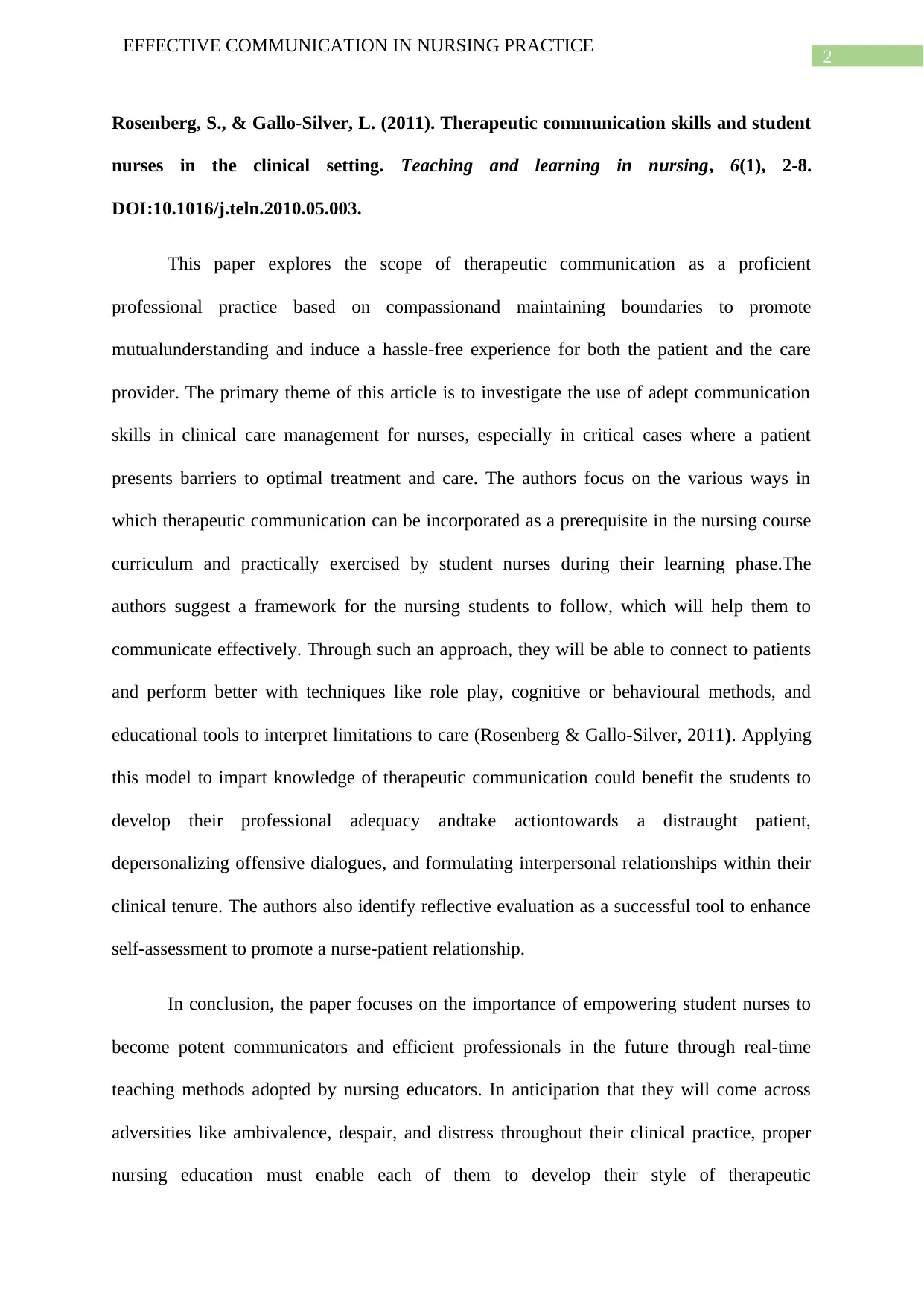
2
EFFECTIVE COMMUNICATION IN NURSING PRACTICE
Rosenberg, S., & Gallo-Silver, L. (2011). Therapeutic communication skills and student
nurses in the clinical setting. Teaching and learning in nursing, 6(1), 2-8.
DOI:10.1016/j.teln.2010.05.003.
This paper explores the scope of therapeutic communication as a proficient
professional practice based on compassionand maintaining boundaries to promote
mutualunderstanding and induce a hassle-free experience for both the patient and the care
provider. The primary theme of this article is to investigate the use of adept communication
skills in clinical care management for nurses, especially in critical cases where a patient
presents barriers to optimal treatment and care. The authors focus on the various ways in
which therapeutic communication can be incorporated as a prerequisite in the nursing course
curriculum and practically exercised by student nurses during their learning phase.The
authors suggest a framework for the nursing students to follow, which will help them to
communicate effectively. Through such an approach, they will be able to connect to patients
and perform better with techniques like role play, cognitive or behavioural methods, and
educational tools to interpret limitations to care (Rosenberg & Gallo-Silver, 2011). Applying
this model to impart knowledge of therapeutic communication could benefit the students to
develop their professional adequacy andtake actiontowards a distraught patient,
depersonalizing offensive dialogues, and formulating interpersonal relationships within their
clinical tenure. The authors also identify reflective evaluation as a successful tool to enhance
self-assessment to promote a nurse-patient relationship.
In conclusion, the paper focuses on the importance of empowering student nurses to
become potent communicators and efficient professionals in the future through real-time
teaching methods adopted by nursing educators. In anticipation that they will come across
adversities like ambivalence, despair, and distress throughout their clinical practice, proper
nursing education must enable each of them to develop their style of therapeutic
EFFECTIVE COMMUNICATION IN NURSING PRACTICE
Rosenberg, S., & Gallo-Silver, L. (2011). Therapeutic communication skills and student
nurses in the clinical setting. Teaching and learning in nursing, 6(1), 2-8.
DOI:10.1016/j.teln.2010.05.003.
This paper explores the scope of therapeutic communication as a proficient
professional practice based on compassionand maintaining boundaries to promote
mutualunderstanding and induce a hassle-free experience for both the patient and the care
provider. The primary theme of this article is to investigate the use of adept communication
skills in clinical care management for nurses, especially in critical cases where a patient
presents barriers to optimal treatment and care. The authors focus on the various ways in
which therapeutic communication can be incorporated as a prerequisite in the nursing course
curriculum and practically exercised by student nurses during their learning phase.The
authors suggest a framework for the nursing students to follow, which will help them to
communicate effectively. Through such an approach, they will be able to connect to patients
and perform better with techniques like role play, cognitive or behavioural methods, and
educational tools to interpret limitations to care (Rosenberg & Gallo-Silver, 2011). Applying
this model to impart knowledge of therapeutic communication could benefit the students to
develop their professional adequacy andtake actiontowards a distraught patient,
depersonalizing offensive dialogues, and formulating interpersonal relationships within their
clinical tenure. The authors also identify reflective evaluation as a successful tool to enhance
self-assessment to promote a nurse-patient relationship.
In conclusion, the paper focuses on the importance of empowering student nurses to
become potent communicators and efficient professionals in the future through real-time
teaching methods adopted by nursing educators. In anticipation that they will come across
adversities like ambivalence, despair, and distress throughout their clinical practice, proper
nursing education must enable each of them to develop their style of therapeutic
⊘ This is a preview!⊘
Do you want full access?
Subscribe today to unlock all pages.

Trusted by 1+ million students worldwide
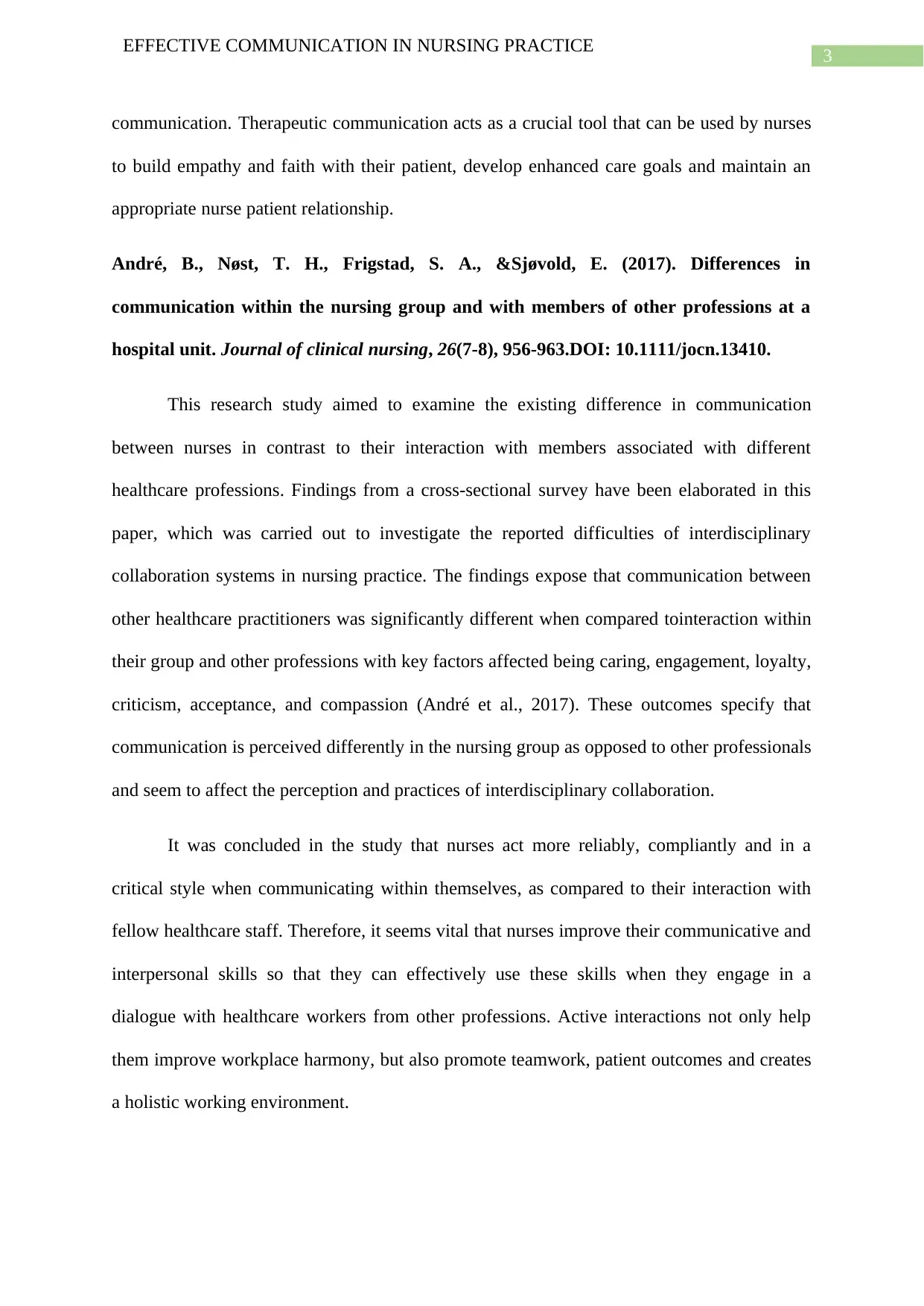
3
EFFECTIVE COMMUNICATION IN NURSING PRACTICE
communication. Therapeutic communication acts as a crucial tool that can be used by nurses
to build empathy and faith with their patient, develop enhanced care goals and maintain an
appropriate nurse patient relationship.
André, B., Nøst, T. H., Frigstad, S. A., &Sjøvold, E. (2017). Differences in
communication within the nursing group and with members of other professions at a
hospital unit. Journal of clinical nursing, 26(7-8), 956-963.DOI: 10.1111/jocn.13410.
This research study aimed to examine the existing difference in communication
between nurses in contrast to their interaction with members associated with different
healthcare professions. Findings from a cross-sectional survey have been elaborated in this
paper, which was carried out to investigate the reported difficulties of interdisciplinary
collaboration systems in nursing practice. The findings expose that communication between
other healthcare practitioners was significantly different when compared tointeraction within
their group and other professions with key factors affected being caring, engagement, loyalty,
criticism, acceptance, and compassion (André et al., 2017). These outcomes specify that
communication is perceived differently in the nursing group as opposed to other professionals
and seem to affect the perception and practices of interdisciplinary collaboration.
It was concluded in the study that nurses act more reliably, compliantly and in a
critical style when communicating within themselves, as compared to their interaction with
fellow healthcare staff. Therefore, it seems vital that nurses improve their communicative and
interpersonal skills so that they can effectively use these skills when they engage in a
dialogue with healthcare workers from other professions. Active interactions not only help
them improve workplace harmony, but also promote teamwork, patient outcomes and creates
a holistic working environment.
EFFECTIVE COMMUNICATION IN NURSING PRACTICE
communication. Therapeutic communication acts as a crucial tool that can be used by nurses
to build empathy and faith with their patient, develop enhanced care goals and maintain an
appropriate nurse patient relationship.
André, B., Nøst, T. H., Frigstad, S. A., &Sjøvold, E. (2017). Differences in
communication within the nursing group and with members of other professions at a
hospital unit. Journal of clinical nursing, 26(7-8), 956-963.DOI: 10.1111/jocn.13410.
This research study aimed to examine the existing difference in communication
between nurses in contrast to their interaction with members associated with different
healthcare professions. Findings from a cross-sectional survey have been elaborated in this
paper, which was carried out to investigate the reported difficulties of interdisciplinary
collaboration systems in nursing practice. The findings expose that communication between
other healthcare practitioners was significantly different when compared tointeraction within
their group and other professions with key factors affected being caring, engagement, loyalty,
criticism, acceptance, and compassion (André et al., 2017). These outcomes specify that
communication is perceived differently in the nursing group as opposed to other professionals
and seem to affect the perception and practices of interdisciplinary collaboration.
It was concluded in the study that nurses act more reliably, compliantly and in a
critical style when communicating within themselves, as compared to their interaction with
fellow healthcare staff. Therefore, it seems vital that nurses improve their communicative and
interpersonal skills so that they can effectively use these skills when they engage in a
dialogue with healthcare workers from other professions. Active interactions not only help
them improve workplace harmony, but also promote teamwork, patient outcomes and creates
a holistic working environment.
Paraphrase This Document
Need a fresh take? Get an instant paraphrase of this document with our AI Paraphraser
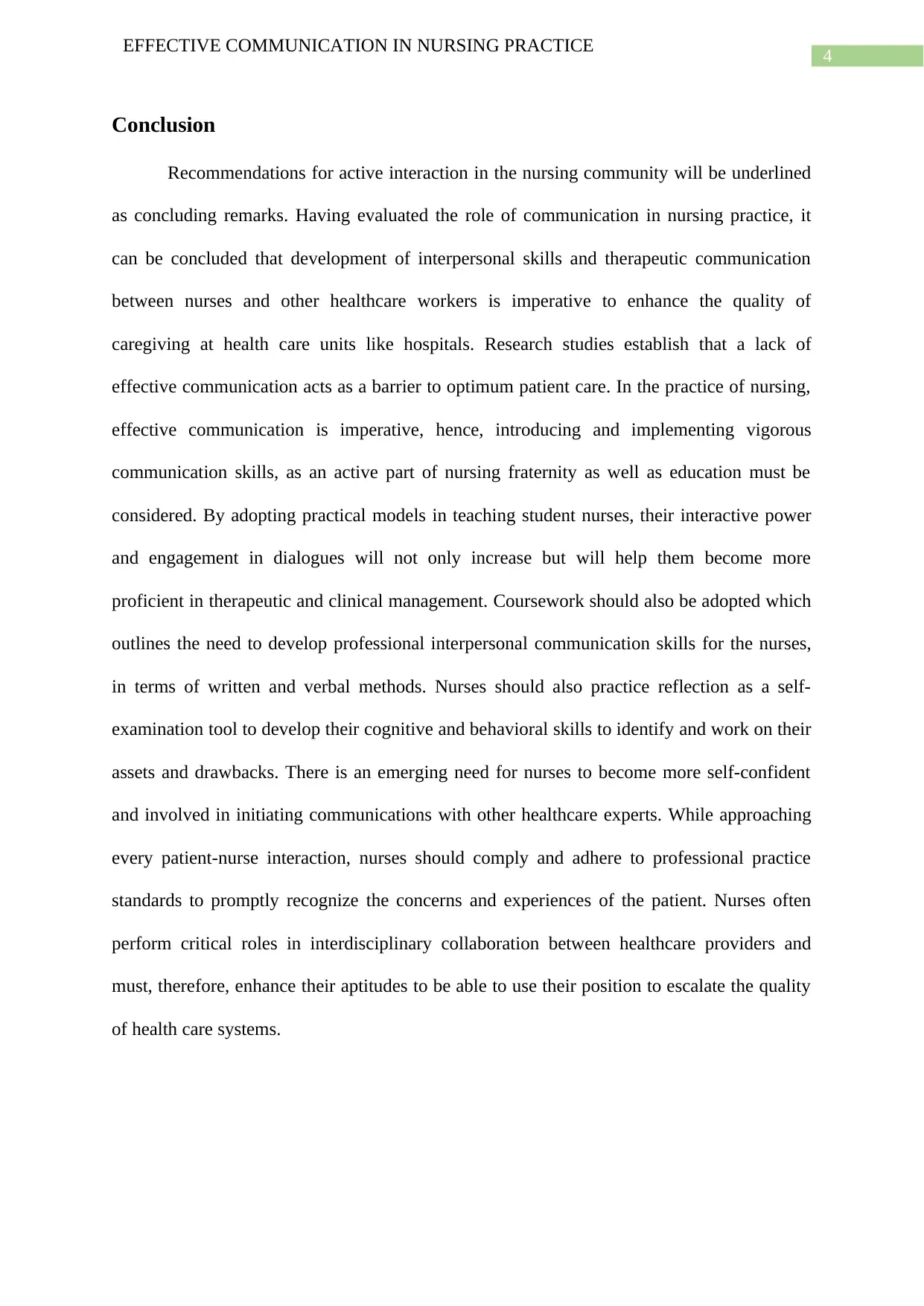
4
EFFECTIVE COMMUNICATION IN NURSING PRACTICE
Conclusion
Recommendations for active interaction in the nursing community will be underlined
as concluding remarks. Having evaluated the role of communication in nursing practice, it
can be concluded that development of interpersonal skills and therapeutic communication
between nurses and other healthcare workers is imperative to enhance the quality of
caregiving at health care units like hospitals. Research studies establish that a lack of
effective communication acts as a barrier to optimum patient care. In the practice of nursing,
effective communication is imperative, hence, introducing and implementing vigorous
communication skills, as an active part of nursing fraternity as well as education must be
considered. By adopting practical models in teaching student nurses, their interactive power
and engagement in dialogues will not only increase but will help them become more
proficient in therapeutic and clinical management. Coursework should also be adopted which
outlines the need to develop professional interpersonal communication skills for the nurses,
in terms of written and verbal methods. Nurses should also practice reflection as a self-
examination tool to develop their cognitive and behavioral skills to identify and work on their
assets and drawbacks. There is an emerging need for nurses to become more self-confident
and involved in initiating communications with other healthcare experts. While approaching
every patient-nurse interaction, nurses should comply and adhere to professional practice
standards to promptly recognize the concerns and experiences of the patient. Nurses often
perform critical roles in interdisciplinary collaboration between healthcare providers and
must, therefore, enhance their aptitudes to be able to use their position to escalate the quality
of health care systems.
EFFECTIVE COMMUNICATION IN NURSING PRACTICE
Conclusion
Recommendations for active interaction in the nursing community will be underlined
as concluding remarks. Having evaluated the role of communication in nursing practice, it
can be concluded that development of interpersonal skills and therapeutic communication
between nurses and other healthcare workers is imperative to enhance the quality of
caregiving at health care units like hospitals. Research studies establish that a lack of
effective communication acts as a barrier to optimum patient care. In the practice of nursing,
effective communication is imperative, hence, introducing and implementing vigorous
communication skills, as an active part of nursing fraternity as well as education must be
considered. By adopting practical models in teaching student nurses, their interactive power
and engagement in dialogues will not only increase but will help them become more
proficient in therapeutic and clinical management. Coursework should also be adopted which
outlines the need to develop professional interpersonal communication skills for the nurses,
in terms of written and verbal methods. Nurses should also practice reflection as a self-
examination tool to develop their cognitive and behavioral skills to identify and work on their
assets and drawbacks. There is an emerging need for nurses to become more self-confident
and involved in initiating communications with other healthcare experts. While approaching
every patient-nurse interaction, nurses should comply and adhere to professional practice
standards to promptly recognize the concerns and experiences of the patient. Nurses often
perform critical roles in interdisciplinary collaboration between healthcare providers and
must, therefore, enhance their aptitudes to be able to use their position to escalate the quality
of health care systems.
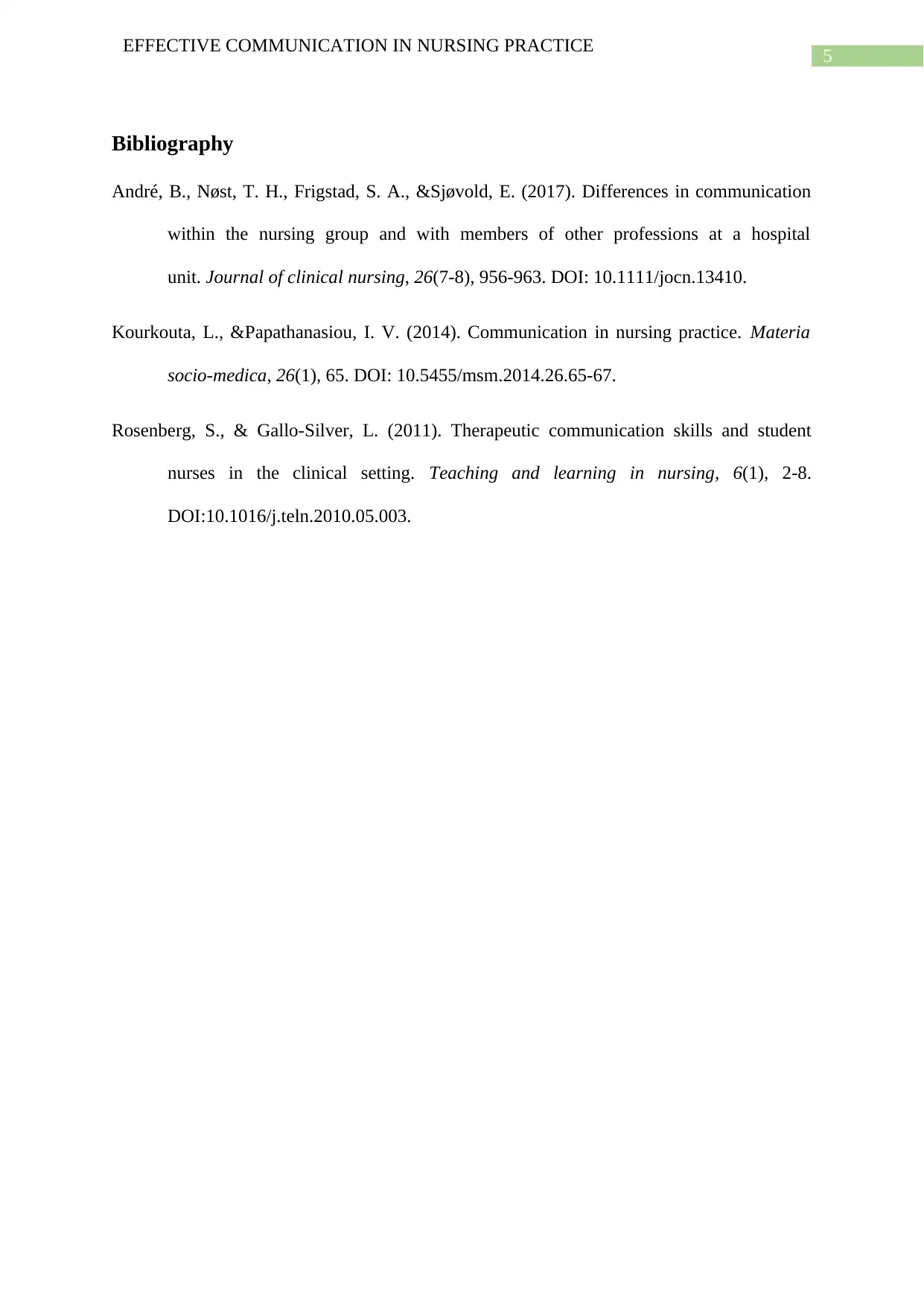
5
EFFECTIVE COMMUNICATION IN NURSING PRACTICE
Bibliography
André, B., Nøst, T. H., Frigstad, S. A., &Sjøvold, E. (2017). Differences in communication
within the nursing group and with members of other professions at a hospital
unit. Journal of clinical nursing, 26(7-8), 956-963. DOI: 10.1111/jocn.13410.
Kourkouta, L., &Papathanasiou, I. V. (2014). Communication in nursing practice. Materia
socio-medica, 26(1), 65. DOI: 10.5455/msm.2014.26.65-67.
Rosenberg, S., & Gallo-Silver, L. (2011). Therapeutic communication skills and student
nurses in the clinical setting. Teaching and learning in nursing, 6(1), 2-8.
DOI:10.1016/j.teln.2010.05.003.
EFFECTIVE COMMUNICATION IN NURSING PRACTICE
Bibliography
André, B., Nøst, T. H., Frigstad, S. A., &Sjøvold, E. (2017). Differences in communication
within the nursing group and with members of other professions at a hospital
unit. Journal of clinical nursing, 26(7-8), 956-963. DOI: 10.1111/jocn.13410.
Kourkouta, L., &Papathanasiou, I. V. (2014). Communication in nursing practice. Materia
socio-medica, 26(1), 65. DOI: 10.5455/msm.2014.26.65-67.
Rosenberg, S., & Gallo-Silver, L. (2011). Therapeutic communication skills and student
nurses in the clinical setting. Teaching and learning in nursing, 6(1), 2-8.
DOI:10.1016/j.teln.2010.05.003.
⊘ This is a preview!⊘
Do you want full access?
Subscribe today to unlock all pages.

Trusted by 1+ million students worldwide
1 out of 6
Related Documents
Your All-in-One AI-Powered Toolkit for Academic Success.
+13062052269
info@desklib.com
Available 24*7 on WhatsApp / Email
![[object Object]](/_next/static/media/star-bottom.7253800d.svg)
Unlock your academic potential
Copyright © 2020–2026 A2Z Services. All Rights Reserved. Developed and managed by ZUCOL.





